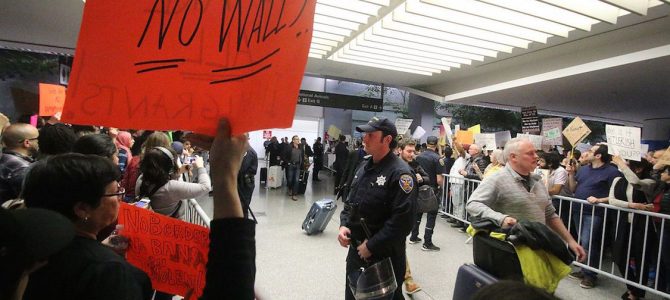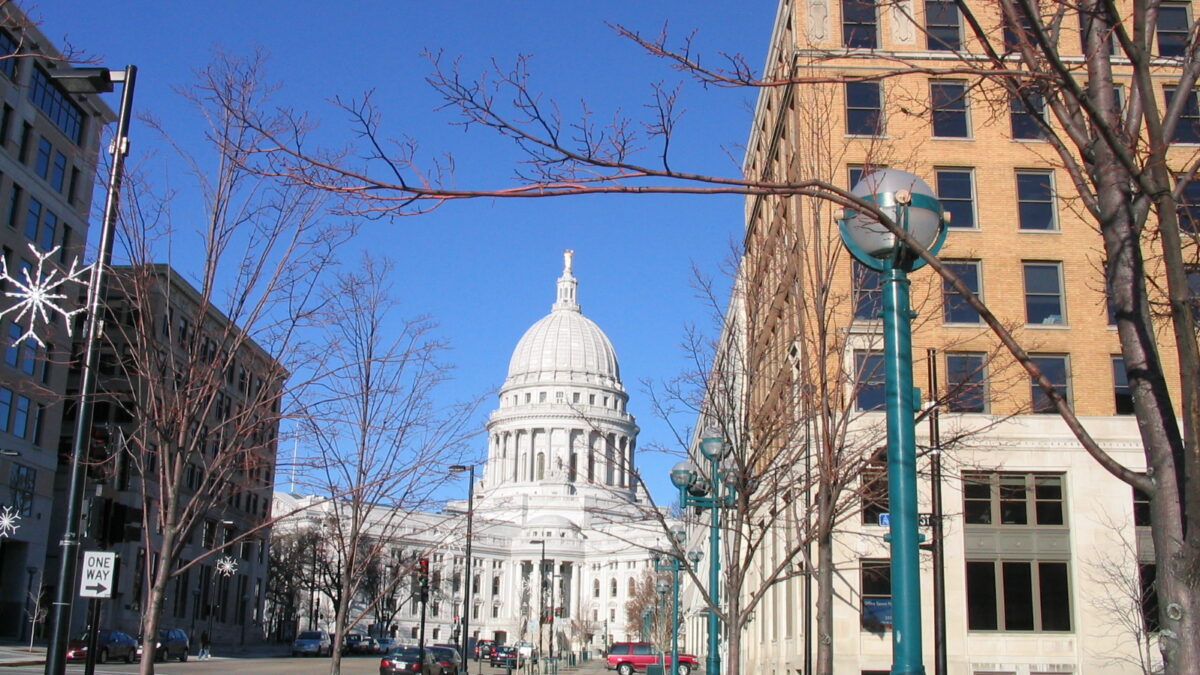
President Trump’s executive order on immigration was back in federal court on Monday. This time around, the Fourth U.S. Circuit Court of Appeals heard oral arguments in the Trump administration’s appeal of a ruling that blocked the travel ban. Next Monday, the Ninth Circuit will hear a separate appeal related to the order.
The White House has maintained that a temporary ban on entry from six Muslim-majority countries is needed for national security reasons. Detractors say the ban is meant to target Muslims, and point to statements Trump made on the campaign trail last year calling for “a total and complete shutdown of Muslims entering the United States.” Therefore, the argument goes, the executive order amounts to religious discrimination and violates the First Amendment’s Establishment Clause.
The 13-judge en banc panel of the Fourth Circuit appeared to take this argument seriously on Monday, with one judge asking if there was “anything other than willful blindness” that should prevent the court from considering Trump’s comments.
Since this issue isn’t going away any time soon, let’s get something straight: the executive order does not violate the Establishment Clause, and in fact has nothing to do with the First Amendment. Simply put, there’s no legal basis for courts to consider statements a politician made before taking office to ascertain his motives for subsequent policy decisions. Policies are either constitutional or unconstitutional on their merits, not because a liberal judge in Washington or Hawaii or Maryland thinks Trump is a bigot.
If the president wants to restrict immigration from certain countries for national security reasons, it is well within his constitutional power to do so. It might be bad policy, it might prove inconvenient for certain businesses and universities, it might even offend the prime minister of Canada, but it’s not religious discrimination—and pointing to past statements to argue that it is sets a very dangerous precedent.
Campaign Statements Can’t Be Policed
Trump said a lot of things on the campaign trail, but as we’re discovering with each passing week, he doesn’t always mean what he says. He said he would label China a currency manipulator, but no. He said NATO is obsolete, but now it’s not. He said he would build a wall along the U.S.-Mexico border, but now it looks like the wall might be delayed indefinitely. More than most politicians, Trump’s campaign pronouncement should be taken with a hearty dose of salt.
But even if Trump really meant what he said about barring Muslims from the United States, it wouldn’t matter from a legal standpoint. Consider the background of Trump’s travel ban saga. The initial order, issued in January just one week into his presidency, was blocked on due process grounds. The White House withdrew that order and issued a new, softer order in March designed to address the due process complaints. But federal trial judges in Maryland and Hawaii immediately blocked that one, too, on the grounds that the legal challenges to the order—alleging it violates the First Amendment prohibition on religious discrimination—were likely to prevail.
As evidence, challengers cited Trump’s campaign rhetoric about a “Muslim ban.” Their argument is straightforward enough: Trump said during his presidential campaign that he would ban Muslims, then issued an order temporarily banning entry from six Muslim-majority countries. Hence, Trump violated the Constitution.
But as Eugene Kontorovich noted at The Volokh Conspiracy back in February, there’s “absolutely no precedent for courts looking to a politician’s statements from before he or she took office, let alone campaign promises, to establish any kind of impermissible motive.”
Indeed, a brief examination of cases suggests the idea has been too wild to suggest. For example, the 10th Circuit has rejected the use of a district attorney’s campaign statements against certain viewpoints to show that a prosecution he commenced a few days after office was ‘bad faith or harassment.’ As the court explained, even looking at such statements would ‘chill debate during campaign[s].’ If campaign statements can be policed, the court concluded, it would in short undermine democracy: ‘the political process for selecting prosecutors should reflect the public’s judgment as to the proper enforcement of the criminal laws.’ Phelps v. Hamilton, 59 F.3d 1058, 1068 (10th Cir. 1995).
The reason for this should be fairly obvious: the purpose of campaign rhetoric is to get elected, not formulate policy—let alone govern. A would-be president has no legal obligation to the Constitution before taking the oath of office; he is merely a private citizen. (Perhaps, as in Trump’s case, a blowhard and a braggart with half-formed ideas, but a private citizen nonetheless.) Once a candidate wins office, he or she is sworn to uphold the duties of that office, not fulfill every promise uttered during the campaign.
This is especially true of the president, who sits atop a vast executive branch that formulates and enforces myriad policies pursuant to its various functions. To say that Trump can’t exercise certain executive powers because of what he said last year, or 20 years ago, is tantamount to saying he can’t really be president because he holds views the judiciary finds offensive. After all, surely some Americans voted for Trump precisely because he promised to ban Muslims. In appealing to those voters, are we to assume Trump forfeited some of his constitutional powers?
There’s A Difference Between Campaigning and Governing
Thankfully, the absurdity of imputing policy motives to the entire executive branch based on Trump’s campaign slogans was not lost on every federal judge who heard arguments about the travel ban. One of the judges on the Ninth Circuit, which upheld a stay on Trump’s first executive order back in January but declined to address the Establishment Clause question, recognized the folly of suggesting Trump’s campaign rhetoric amounts to a violation of the First Amendment.
In a dissent filed in March, Judge Alex Kozinski lambasted his fellow judges for going on an “evidentiary snark hunt” to prove Trump meant what he said on the campaign trail about banning Muslims.
This is folly. Candidates say many things on the campaign trail; they are often contradictory or inflammatory. No shortage of dark purpose can be found by sifting through the daily promises of a drowning candidate, when in truth the poor shlub’s only intention is to get elected. No Supreme Court case—indeed no case anywhere that I am aware of—sweeps so widely in probing politicians for unconstitutional motives. And why stop with the campaign? Personal histories, public and private, can become a scavenger hunt for statements that a clever lawyer can characterize as proof of a -phobia or an -ism, with the prefix depending on the constitutional challenge of the day.
When two Ninth Circuit judges suggested it was inappropriate for Kozinski to address the establishment question because it was not before the court, Kozinski wrote that his “colleagues’ effort to muzzle criticism of an egregiously wrong panel opinion betrays their insecurity about the opinion’s legal analysis.”
If there is a First Amendment issue in the case, Kozinski argued, it was about Trump’s own free speech protections, not the Establishment Clause. After all, relying on campaign speeches and slogans to prove discriminatory intent would abrogate political candidates’ right to engage in free speech. “This path is strewn with danger,” writes Kozinski, citing a 2014 Supreme Court case, McCutcheon v. FEC. “It will chill campaign speech, despite the fact that our most basic free speech principles have their ‘fullest and most urgent application precisely to the conduct of campaigns for political office.’”
In the coming weeks and months, we’re going to keep hearing about the “constitutionality” of Trump’s travel ban. Don’t be fooled. This has nothing to do with the Constitution and everything to do with deep-seated contempt for Trump—and not just Trump, but every American who thinks a temporary ban on immigration from certain countries might be a good idea.









